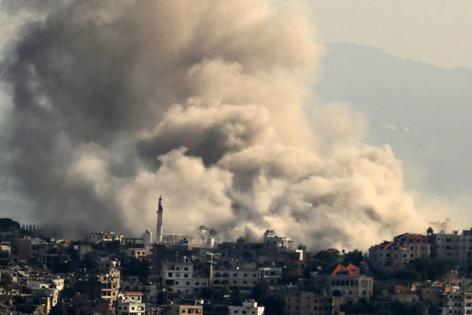Israel says it's still committed to ceasefire after new strikes
Published in News & Features
The Israel Defense Forces said the country “remains obligated” to a U.S.-backed ceasefire after carrying out airstrikes in Lebanon Monday in response to Hezbollah’s first attack under the truce, shrugging off fears that the agreement might collapse.
After Hezbollah claimed the attack on an Israeli military site in a disputed area near the borders with Lebanon and Syria on Monday, the IDF launched its heaviest airstrikes in Lebanon since the ceasefire plan came into effect less than a week ago. The Israeli army said it targeted militants, dozens of launchers and infrastructure belonging to the group throughout Lebanon.
Airstrikes targeted various areas in southern Lebanon while low-flying drones were seen over Beirut and its southern suburbs, according to the Lebanese state news agency NNA. Lebanon’s heath ministry said at least nine people were killed and three were injured in two airstrikes.
“The State of Israel demands that the relevant parties in Lebanon fulfill their responsibilities and prevent Hezbollah’s hostile activity from within Lebanese territory,” the IDF said.
Iran-backed Hezbollah said its attack on the Israeli military site was a “defensive response” to “recurrent violations” by the IDF in Lebanon over the past week.
The attack also served as a warning to the Israeli army, the militant group said on its Telegram channel, citing earlier Israeli airstrikes in different parts of Lebanon. The IDF said Hezbollah, designated by the U.S. as a terrorist organization, had launched two projectiles toward the area of Har Dov that fell in open areas with no casualties reported.
Israeli Prime Minister Benjamin Netanyahu was quick to respond, saying Hezbollah wouldn’t go unpunished. “Hezbollah fire at Mt. Dov constitutes a severe violation of the ceasefire, and Israel will respond forcefully. We are determined to continue enforcing the ceasefire and will respond to every Hezbollah violation – minor and major,” he said, according to his office’s account on X.
The U.S.-brokered deal, in effect since dawn on Wednesday, suspended more than a year of hostilities that had raged in parallel to the Israel-Hamas war in Gaza. The conflict was limited for months to the cross-border trading of missile fire but intensified in September when Israel launched strikes against the Hezbollah leadership and mounted a ground invasion the following month.
John Kirby, spokesman for the U.S. National Security Council, told reporters Monday that the ceasefire is holding, “largely speaking.”
“We went from hundreds of rocket attacks to basically zero by Hezbollah and dozens of airstrikes by Israel to one or two per day,” he said. “So there’s been a dramatic reduction in the violence.” He said a U.S. Army general is working out of the American embassy in Beirut to revolve incidents as part of a mechanism intended to curb attacks.
Under the agreement, Israel has 60 days to leave areas it has occupied in Lebanon. After that, the Lebanese army is supposed to deploy to an area south of the Litani River, about 30 kilometers (19 miles) from the Israeli border, and ensure an end to Hezbollah’s military presence there, as stipulated by an earlier United Nations resolution.
The IDF says it’s maintaining a presence in southern Lebanon for now to ensure the safety of Israel and its residents. On Friday, the Lebanese army said Israel breached the accord multiple times over the past two days through “aerial violations and the targeting of Lebanese territories with various weapons,” according to a statement on X.
_____
(With assistance from Skylar Woodhouse.)
_____
©2024 Bloomberg L.P. Visit bloomberg.com. Distributed by Tribune Content Agency, LLC.







Comments